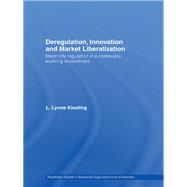- ISBN: 9780415541183 | 0415541182
- Cover: Nonspecific Binding
- Copyright: 3/13/2012
Over the past 50 years the US economy has experienced economic dynamism and technological change at a dizzying pace, driven substantially by innovation in digital communication technology. This dynamism has had limited effects in the electricity industry, and institutional change within the industry to adapt to these changes has been variable. Many states in the U.S. do not participate in open wholesale markets, and even more states have either no retail markets or have implemented such a restricted and politicized version of retail markets that potential retail market entrants still face substantial entry barriers. This book explores institutional design and regulatory policies in the US electricity industry that can adapt to unknown and changing conditions produced by economic, social, and technological change. Whereas the dominant regulatory paradigm has traditionally been centralized economic and physical control based on natural monopoly theory and power systems engineering, the ideas presented and synthesized by Kiesling compose a different paradigm decentralized economic and physical coordination through contracts, transactions, price signals, and integrated intertemporal wholesale and retail markets. Digital communication technology, and its increasing pervasiveness and affordability, make this decentralized coordination possible. Kiesling argues that with decentralized coordination, distributed agents themselves control part of the system, and in aggregate their actions produce order. Technology makes this order feasible, but the institutions, the rules governing the interaction of agents in the system, contribute substantially to whether or not order can emerge from this decentralized coordination process.







